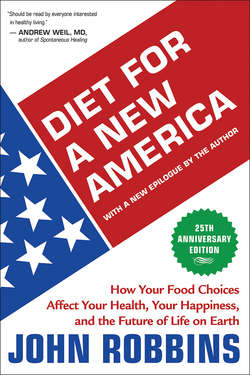Читать книгу Diet for a New America 25th Anniversary Edition - John Robbins - Страница 25
На сайте Литреса книга снята с продажи.
We All Need Love
ОглавлениеProponents of the attitude that animals are ours to use, while sometimes acknowledging that animals may experience pain at a physical level, assert that they are not capable of suffering as we know it because their pain has no meaning to them. It is, say these “experts,” just sensation. Accordingly, animals can’t suffer as we can because their sensations of pain have no emotional meaning for them.
I don’t agree. There are many kinds of emotional suffering that we human beings have the ability to experience and all are connected, in one way or another, to our capacity to feel with other beings. And animals have that capacity.
There is a relationship between the capacity of a being to love and its capacity to suffer, regardless of its species. If a being, of whatever species, has the capacity to give and receive love, then certainly it will suffer if that capacity is thwarted. This is one of the reasons all the wisdom traditions of the world teach us that a sure way to make yourself miserable is not to express your love.
We need both to receive and to give love. Love is food for our souls, and without it we suffer greatly, just as we suffer physically if we starve. Have you ever watched an infant carefully, while it is being stroked and petted? We all know babies love and thrive on this kind of attention, but have you ever looked closely at the physiological changes they undergo? There is a distinct and well-defined pattern in their young nervous systems. The heart rate slows down, muscles relax, peristaltic waves increase, and digestive juices flow. Among other things, these changes allow for the formation of the crucial mother-child bonding. And so if the little one is not petted and stroked, and thus does not undergo these physiological changes, the bonding will not occur.
One of the results of this is that the little human baby will have a hard time establishing social bonds in its later life. Another result when an infant is deprived of touching is that it literally shrivels. Because its digestive juices are not fully activated, it fails to receive proper nourishment and so its physical growth is retarded. The little one will do the best it can to survive under the circumstances, and this may mean developing what we call neurotic or, in extreme cases, psychotic symptoms, in the attempt somehow to compensate for the missing mother love. If the deprivation is sufficiently severe, the infant will habitually repeat the gestures of its compensation for the rest of its life.
Now, it may surprise people who think animals are objects, but every single word you have just read about human infants, about their physiological and emotional responses to stroking and petting, and about the consequences if they are deprived of this attention, is true not only for human babies. It is also true, in every detail, for puppies, kittens, baby monkeys, and a large number of other mammals.33
Dr. Harry Harlow, at the University of Wisconsin, has done extensive studies on the influence of love and affection in the lives of subhuman primates. In one appalling experiment, monkeys were deprived of their mothers. The result?
They have shown many signs of extreme neuroticism and even psychosis. Most of them spend their time sitting passively staring out into space, not interested in other monkeys or anything else.
Some of them tensely wind themselves into tortured positions, and others tear at their flesh with their teeth…These are all symptoms found in human adults confined in institutions for the insane.
Mother dolphins nurse their young for 18 months, and the mother-child bond is deep and enduring. Dolphins four to six years old have been known to seek out their mothers from a group when they become sleepy or frightened. So devoted are these animals to the welfare of one another that they will not abandon or desert a fellow dolphin who seems to be injured or distressed even if it costs them their life. When infant dolphins are caught in tuna nets, their mothers will go to extraordinary lengths to join their doomed young. Once in the nets, they will huddle together with their offspring, singing to them. The tuna industry takes note of this only to acknowledge that the majority of dolphins killed in their nets are females and infants.34
It’s not only with dolphins, and it is not only in the parent-child relationship that animal love is evident. Even hard-nosed scientists who have studied wolves have been consistently amazed at the exceptional degree of what can only be called love and affection they show for one another. Gordon Haber, who has studied wolves for decades and is recognized as one of the world’s leading wolf experts, notes that one of the outstanding features of these animals is their profound devotion and caring for one another. For example, he saw a wounded wolf in Alaska, its shoulder shattered and bleeding from being kicked by a caribou, limp into an abandoned cabin and lie down, seemingly to die alone as animals often do. But each night another wolf crept into the cabin and fed its crippled friend by bringing it chunks of meat. He continued to care for the wounded wolf until it recovered.35
Many animals, including beavers, geese, eagles, wolves, hawks, penguins, lynxes, and mountain lions, mate monogamously for life and are utterly devoted to their mates in a way that most married humans—who have pledged to care for each other “until death do us part”—could never imagine. Animals can suffer precisely because they have the ability to give and receive love, and a need to do so.
